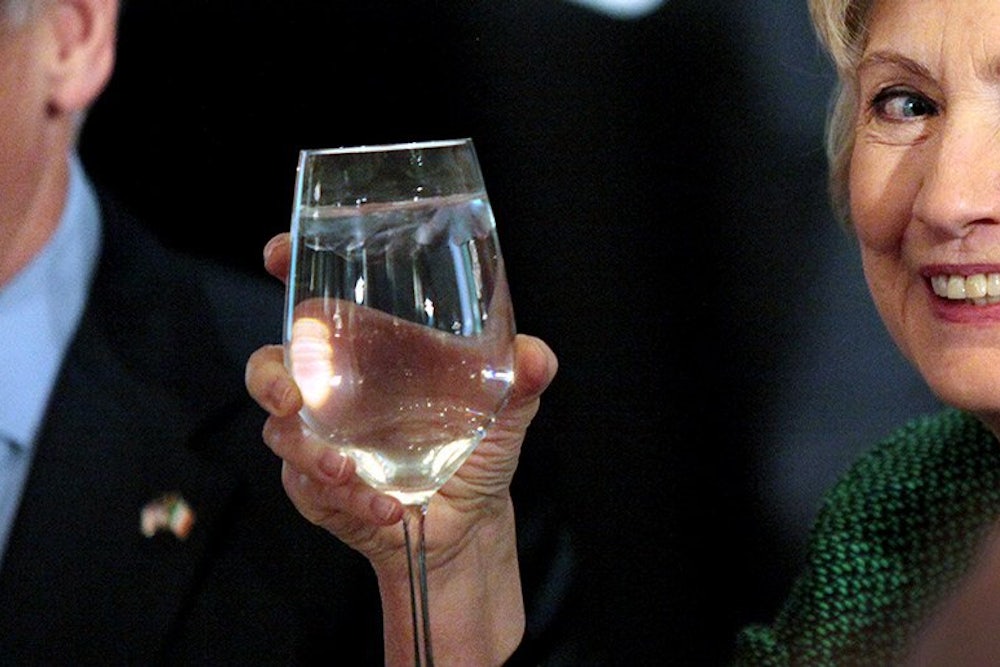Months of rumors, speculation and reports that Hillary Clinton would stave off an official campaign announcement until the middle of the year have recently given way to a fresh consensus—that the Clinton 2016 launch is imminent. But pundits who suppose that the controversy over her use of private email as secretary of state has hurried her plans are incorrect. The real driving force is money.
The most important date on the nascent Clinton campaign's calendar is April 1: the beginning of second-quarter campaign finance reporting, which means, for reasons that have more to do with ambitious fundraising goals than worries over tamping down criticism, this time next month, likely-candidate will be candidate Clinton, full stop.
Nobody expects that Clinton will have a hard time raising money, but she faces both practical and political imperatives to raise substantial sums from small-dollar donors. The longer she waits before she launches, the harder it will be for her both to raise the $1.1 billion she’d like to raise between launch and 2016, and to demonstrate that her operation isn’t overwhelmingly dependent on special interests and wealthy contributors.
In the days before the email controversy broke in early March, fundraising advisers close to Clinton were already telling The New Republic to expect an early spring, as opposed to early summer launch, suggesting a minor dispute between finance and political advisers that the money people had already won.
“[T]he speculation in the press that her announcement timeline has vacillated greatly and changed even in light of the controversy around the emails is an invented theory,” said one adviser close to Clinton. Her spokesman, Nick Merrill, did not respond to an email requesting comment.
The perception that Clinton's previous candidacy lacked grassroots support, exacerbated by the fact that she was under-equipped to collect small dollar donations, invited withering attacks from her top primary campaign rivals, John Edwards and Barack Obama, back in 2007 and 2008. It also highlights the political importance of having a robust grassroots fundraising apparatus, with plenty of time to collect donations.
During a January 2008 debate, Obama was able to deflect an attack on his fundraising prowess by explaining that “if you’ve got a mid-level executive at a drug company or an insurance company who is inspired by my message of change, and they send me money, then that’s recorded as money from the drug or the insurance industry, even though it’s not organized, coordinated or in any way subject to the problems that you see when lobbyists are giving money.”
Back then, Clinton was unable to offer a similarly compelling rejoinder. The decision to launch in April suggests she learned a key lesson.
Political reporters, uniquely attuned to even the subtlest strategic developments, have taken note of the change in Clinton campaign thinking with great interest. That it developed amid the frenzy surrounding Clinton’s aversion to official government email as secretary of state created the appearance that the controversy had shaken Clinton’s advisers and convinced them that she couldn’t hold on to the fiction that she’s merely considering a run until July.
“The controversy is pushing Clinton’s top advisers closer to formalizing plans to announce her candidacy in early spring,” according to the Associated Press, “all but putting an end to discussions about holding off until later in the year, according to a person familiar with the operation.”
The connection drawn here might reflect post hoc thinking, or perhaps the email controversy quite literally put an end to those discussions, because those discussions were already largely over.
“That is a discussion before all the campaigns actually launch,” said Julianna Smoot, finance director for Obama’s 2008 campaign. “But the money will actually be there. ... I was probably more nervous about this in ’07 than they are now.”
“She is in a less crowded primary field, presumably. She will be able to raise all the money she needs. And she’ll have everything set up so that people will be able to give online,” Smoot added. “I think they’ve learned too, and the online fundraising has gotten so much more advanced. They’ll be able to reach out to different demographics. ... I just don’t think she was set up for that stuff last time as well as we were.”
If everything goes as reports suggest, Clinton’s team will have an additional three months to raise money—and, crucially, will build up a reservoir of money before the end of the second quarter reporting period.
“That third quarter is the hardest one to raise money in,” Smoot told me. “People aren’t paying attention. They’re on vacation. It’s harder [to fundraise] July and August than it is in April and May.”
